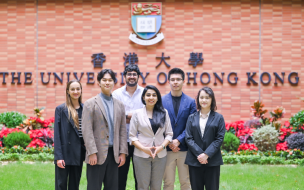Payal Budhraja relocated from India to pursue a two-year Global Master’s in Management (GMiM) at the London School of Economics (LSE). Next year, she’ll spend a term at a top business school in the US.
A trained pharmacist, Payal wants to go into healthcare consulting after her GMiM. She thinks her experience in the US will stand her in good stead.
“The US is at the forefront of pharma and healthcare,” she says. “Having the experience there, will make me more attractive to employers.”
“LSE is very international,” she continues. “You build your contacts in different countries. And the more you talk to different people, you come to know about so many different things happening around the world.”
LSE is ranked fifth in the world for its reputation among employers by QS. Its exchange partners include France’s HEC Paris, Duke University’s Fuqua School of Business, Yale school of Management, and Johnson at Cornell in the US.
It’s also part of CEMS; a global alliance of 30 business schools, NGOs and corporate partners, who’ve come together to offer the CEMS Master’s in International Management.
After a first year on campus in London, GMiM students can apply either to the GMiM Exchange program – and spend a term studying abroad at a leading business school in the US or Europe – or the CEMS MiM, with its focus on business ethics and global citizenship.
For Emma Gavala, a Greek GMiM student currently on her CEMS exchange at ESADE Business School in Barcelona, the opportunity to gain a double degree qualification was a major draw. Emma interned at Google this summer and is keen to return to the company in a full-time role.
“CEMS makes me more competitive,” she says. “It gives you an additional perspective in management. It’s not just about the hard skills. CEMS cares about our personal development.
“And it's such a big community, extending from Japan to Chile. We have a common identity, we share common experiences, goals, and a network.”
LSE is a leading social science university with a global footprint. It’s the only UK institution to offer the CEMS double degree. This year’s GMiM class consists of 123 students of 37 different nationalities.
“LSE was my only application,” Emma continues. “In other business schools, marketing, accounting and finance are taught in isolated blocks. Here, I’m exposed to a very holistic, integrated view of management which sharpens my critical thinking."
Payal agrees. She chose LSE over London Business School (LBS) for her GMiM.
“LSE is not a business school,” she says. “The way it teaches is different. Business schools tell you a certain way of doing things. LSE goes into the causes of things; how things have come to be how they are today. Everyday there’s something new.”
LSE’s alumni community is made up of more than 136,000 people from almost 200 countries worldwide. And many GMiM graduates enjoy successful careers working for top multinationals like Google, Accenture, Barclays and the Boston Consulting Group.
For Sandy Pepper, the GMiM’s director, this comes as no surprise:
“Graduate employers are attracted to students with an understanding of international business management and global markets, especially those who are used to working in diverse teams and who have experienced what it is like to live outside their home countries,” he continues.
“GMiM students are uniquely well-qualified in all these respects.”
RECAPTHA :
05
7d
76
3e








